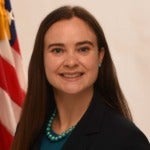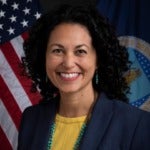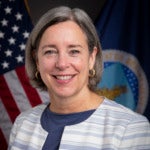Financial Resilience Summit: The Future of Public Benefits Modernization
The United States faces a unique opportunity to support financial resilience through better access to critical public benefits. In this discussion, co-hosted by the Office of Management and Budget and the Aspen Institute Financial Security Program federal, state, local, and nonprofit sector leaders highlighted new ways to improve and scale public benefits delivery innovations. The event is supported in part through the Aspen Institute’s partnership with the Families and Workers Fund.
Agenda
Welcome
Speakers:
- Neera Tanden, Domestic Policy Advisor to the President, Director of the Domestic Policy Council, White House
- Ida Rademacher, Vice President, Aspen Institute, Co-Executive Director, Aspen Institute Financial Security Program
Federal Agency Action on Financial Resilience
Federal agency leaders will highlight actions taken since the 2023 Summit to improve public benefits delivery, share lessons learned, and elevate state and local opportunities for continuing this progress.
Speakers include:
- Andrea Palm, Deputy Secretary, U.S. Department of Health and Human Services
- Mina Hsiang, Administrator, U.S. Digital Service, Office of Management and Budget
- Xochitl Torres Small, Deputy Secretary, U.S. Department of Agriculture
- Sarah Esty, Senior Advisor for Technology and Delivery to the Deputy Secretary, U.S. Department of Health and Human Services (Moderator)
Federal Investment in Customer Service
Speakers:
- Jason Miller, Deputy Director for Management, Office of Management and Budget
Lessons Learned from Medicaid Unwinding
Speakers:
- Luke Farrell, Lead Product Manager, U.S. Digital Service, Office of Management and Budget (Moderator)
- Daniel Tsai, Deputy Administrator and Director of the Center for Medicaid and CHIP Services, Center for Medicare and Medicaid Services
- Yingjia Huang, Assistant Deputy Director Health Care Benefits and Eligibility, California Department of Health Care Services
- Robynn Butler, Bureau Chief Medicaid Systems, South Carolina Department of Health and Human Services
- Nicole Hudson, Senior Advisor on Special Projects, Michigan Department of Health and Human Services
Break
Federal Remarks: New Directions and Opportunities
Speakers:
- Alicia Rouault, Deputy Director, Facing Financial Shock, U.S. Digital Service, Office of Management and Budget (Moderator)
- Jennifer Cannistra, Deputy Assistant Secretary for Policy, Administration for Children and Families, U.S. Department of Health and Human Services
- Stacy Dean, Deputy Under Secretary for Food, Nutrition, and Consumer Services, U.S. Department of Agriculture
- Ann Lewis, Director, Technology Transformation Services, U.S. General Services Administration
Announcement: New Philanthropic Commitments to Public Benefits Access and Delivery
A collaborative of 40 diverse philanthropies will announce their commitments to support streamlined public benefits access and delivery for claimants and administrators.
Speakers:
- Rachel Korberg, Executive Director and Cofounder, Families and Workers Fund
- Tyonka Perkins Rimawi, Program Director, Families and Workers Fund
- Korey Klein, Senior Portfolio Manager, Ballmer Group
Making Public Benefits Modernization Work for States and Families
State agency leaders will highlight work from the past year, key initiatives for the year ahead, and continuing challenges in modernizing public benefits systems.
Speakers:
- Tim Shaw, Policy Director, Aspen Institute Financial Security Program (Moderator)
- Kelly Garcia, Director, Iowa Department of Health and Human Services
- Jilma Meneses, Secretary, Washington State Department of Social and Health Services
- Alana Gracey, Community Advisory Group Member, Aspen Institute Financial Security Program
- Alice Aluoch, Director, Membership and Development, GHC, CLASP
Closing Remarks
Speakers:
- Joanna Smith-Ramani, Co-Executive Director, Aspen Institute Financial Security Program
Speaker Biographies
 Ida Rademacher is a vice president at the Aspen Institute and co-executive director of the Aspen Financial Security Program. She also launched and leads the Aspen Partnership for an Inclusive Economy. A leading voice on Americans’ financial health, Ida is also known for building innovative teams, initiatives and events that fuel new insights and fresh thinking about how to simultaneously build economic inclusion and economic growth. Her efforts have resulted in the creation of several cutting-edge initiatives and events, including the Expanding Prosperity Impact Collaborative (EPIC), the Aspen Leadership Forum on Retirement Savings, Benefits21, the Global Inclusive Growth Summit and The Future of Wealth.
Ida Rademacher is a vice president at the Aspen Institute and co-executive director of the Aspen Financial Security Program. She also launched and leads the Aspen Partnership for an Inclusive Economy. A leading voice on Americans’ financial health, Ida is also known for building innovative teams, initiatives and events that fuel new insights and fresh thinking about how to simultaneously build economic inclusion and economic growth. Her efforts have resulted in the creation of several cutting-edge initiatives and events, including the Expanding Prosperity Impact Collaborative (EPIC), the Aspen Leadership Forum on Retirement Savings, Benefits21, the Global Inclusive Growth Summit and The Future of Wealth.
In Ida’s prior work as Chief Program Officer at Prosperity Now (formerly CFED), she created the multi-institutional team responsible for leading the U.S. Consumer Financial Protection Bureau’s Consumer Financial Well-Being Metrics Project, and also led the creation of Upside Down, a program examining ways the U.S. income tax code generates disparate wealth building opportunities and contributes to growing levels of wealth inequality.
Ida has testified on numerous occasions before Congress and contributes regularly to news and commentary on economic policy and consumer finance topics in outlets including the New York Times, the Wall Street Journal, the Washington Post, Politico and Marketplace.
 Neera Tanden currently serves as Domestic Policy Advisor to President Biden. Previously, she was Senior Advisor and Staff Secretary in the White House. She has served in both the Obama and Clinton administrations, as well as presidential campaigns and think tanks. Prior to her roles in the Biden-Harris Administration, Neera was the President and CEO of the Center for American Progress and the Center for American Progress Action Fund, one of the largest think tanks in the country, with teams across all components of domestic policy including crime, education, immigration, health care, civil rights, and more. As President of CAP, Neera drove ideas that became part of the Biden-Harris agenda: proposals on clean energy subsidies, a new child care program, and closing the “boyfriend loophole” on guns.
Neera Tanden currently serves as Domestic Policy Advisor to President Biden. Previously, she was Senior Advisor and Staff Secretary in the White House. She has served in both the Obama and Clinton administrations, as well as presidential campaigns and think tanks. Prior to her roles in the Biden-Harris Administration, Neera was the President and CEO of the Center for American Progress and the Center for American Progress Action Fund, one of the largest think tanks in the country, with teams across all components of domestic policy including crime, education, immigration, health care, civil rights, and more. As President of CAP, Neera drove ideas that became part of the Biden-Harris agenda: proposals on clean energy subsidies, a new child care program, and closing the “boyfriend loophole” on guns.
Neera previously served as senior advisor for health reform at the Department of Health and Human Services, working on President Barack Obama’s health reform team in the White House. Prior to that, she was the director of domestic policy for the Obama-Biden presidential campaign, where she managed all domestic policy proposals. Neera also served as policy director for the Hillary Clinton presidential campaign, where she directed all policy work, ranging from domestic policy to the economy to foreign affairs, and managed day-to-day policy announcements. She received her BS from UCLA and her JD from Yale Law School.
 Sarah Esty currently serves as Senior Advisor for Technology and Delivery to the Deputy Secretary of the Department of Health and Human Services, where she drives cross-cutting data, technology, and customer experience projects across HHS. She is also the co-lead of the Facing Financial Shocks Interagency Implementation Team, which provides multi-program technical assistance, tools, guidance, and templates to support State delivery transformation efforts in Medicaid, SNAP, TANF, CCDF, LIHEAP, and other means-tested benefits that serve low-income families. Esty was previously a Senior Advisor at the Administration for Children and Families at HHS working on a range of projects from streamlining case management for unaccompanied children, to improving the grantmaking process across ACF, to designing a model child care application. Prior to joining the federal government, Esty served as Policy Director at Michigan HHS, where she led Medicaid behavioral health and specialty services integration, cross-cutting strategic projects in Health Information Technology, opioid response, and Social Determinants of Health, and drove major elements of the state’s COVID-19 pandemic response. She previously worked at McKinsey, the National Economic Council, and Connecticut Voices for Children. She has a BA from Harvard, and a JD/MBA from Yale.
Sarah Esty currently serves as Senior Advisor for Technology and Delivery to the Deputy Secretary of the Department of Health and Human Services, where she drives cross-cutting data, technology, and customer experience projects across HHS. She is also the co-lead of the Facing Financial Shocks Interagency Implementation Team, which provides multi-program technical assistance, tools, guidance, and templates to support State delivery transformation efforts in Medicaid, SNAP, TANF, CCDF, LIHEAP, and other means-tested benefits that serve low-income families. Esty was previously a Senior Advisor at the Administration for Children and Families at HHS working on a range of projects from streamlining case management for unaccompanied children, to improving the grantmaking process across ACF, to designing a model child care application. Prior to joining the federal government, Esty served as Policy Director at Michigan HHS, where she led Medicaid behavioral health and specialty services integration, cross-cutting strategic projects in Health Information Technology, opioid response, and Social Determinants of Health, and drove major elements of the state’s COVID-19 pandemic response. She previously worked at McKinsey, the National Economic Council, and Connecticut Voices for Children. She has a BA from Harvard, and a JD/MBA from Yale.
 Andrea Palm is the Deputy Secretary of the Department of Health and Human Services (HHS). As Deputy Secretary, she is the Chief Operating Officer and is responsible for overseeing the day-to-day operations of the Department.
Andrea Palm is the Deputy Secretary of the Department of Health and Human Services (HHS). As Deputy Secretary, she is the Chief Operating Officer and is responsible for overseeing the day-to-day operations of the Department.
Palm most recently served as Secretary-designee of the Department of Health Services (DHS), overseeing one of the largest state agencies in Wisconsin as a member of Governor Tony Evers’ cabinet. In this role, she had responsibility for the state’s Medicaid program, its Supplemental Nutrition Assistance Program (SNAP), and behavioral health programs, among others. DHS is also Wisconsin’s public health agency, and as such, Palm led the state’s response to the COVID-19 pandemic.
Previously, Palm held a number of policy and operational roles in the Obama-Biden Administration at HHS, including Acting Assistant Secretary for Legislation, Counselor, Chief of Staff and Senior Counselor to the Secretary. During her eight-year tenure, she worked on a variety of Administration priorities, including the Affordable Care Act, as well as providing leadership for the Department’s work to combat the opioid epidemic.
Palm was born and raised in rural, upstate New York. She holds a Bachelor’s degree from Cornell University and a Master’s degree from Washington University in St. Louis.
 Xochitl Torres Small was confirmed by the United States Senate to serve as Deputy Secretary of Agriculture on July 11, 2023. She is the first Latina to hold this position.
Xochitl Torres Small was confirmed by the United States Senate to serve as Deputy Secretary of Agriculture on July 11, 2023. She is the first Latina to hold this position.
Prior to her confirmation as Deputy Secretary, Torres Small served as Under Secretary for Rural Development. In this role, she oversaw loans and grants to provide infrastructure improvements; business development; affordable housing; community facilities such as schools, public safety and health care; and high-speed internet access in rural, Tribal, and high-poverty areas. During her leadership, USDA Rural Development secured $2 billion to support rural broadband through the Bipartisan Infrastructure Law.
Prior to joining USDA, Torres Small was a United States Representative for the fifth largest district in the country. As Representative, Torres Small served as a member of the House Agriculture Committee, the House Armed Services Committee and as chairwoman of the Oversight, Management, and Accountability subcommittee of the House Homeland Security Committee. Torres Small was the first woman and first person of color to represent New Mexico’s second congressional district.
The granddaughter of farmworkers, Torres Small grew up in the borderlands of New Mexico. She has worked as a field representative for Senator Tom Udall, a clerk for United States District Court Judge Robert C. Brack, and an attorney practicing water and natural resources law. Torres Small has a law degree from the University of New Mexico School of Law, an undergraduate degree from Georgetown University’s School of Foreign Service, and an international baccalaureate from Waterford Kamhlaba United World College of Southern Africa. She’s married to New Mexico State Representative Nathan Small.
 Mina Hsiang is the third Administrator of the United States Digital Service (USDS) and has been in the role since August 2021. As Administrator, she leads the organization within the Executive Office of the President, charged with tackling government’s most critical technology challenges to deliver simpler, more secure, and more efficient government services for the American public. Core to this work is bringing top technical talent from the private sector into civil service, and rethinking how the government manages and buys digital capabilities. USDS is home to over 200 top technologists working across multiple agencies to tackle dozens of critical problems.
Mina Hsiang is the third Administrator of the United States Digital Service (USDS) and has been in the role since August 2021. As Administrator, she leads the organization within the Executive Office of the President, charged with tackling government’s most critical technology challenges to deliver simpler, more secure, and more efficient government services for the American public. Core to this work is bringing top technical talent from the private sector into civil service, and rethinking how the government manages and buys digital capabilities. USDS is home to over 200 top technologists working across multiple agencies to tackle dozens of critical problems.
In the private sector, Hsiang was VP of Technology Products and VP of Policy at an integrated insurance and services startup for seniors that she helped start and grow into a 700+ person company. She previously led new product development for the analytics division at a large healthcare technology & services company. She spent time as a venture investor and advisor, helping start and grow companies across multiple industries. Hsiang spent her early career building cutting-edge medical devices including point-of-care diagnostics and robotic prosthetics.
Hsiang has also held roles that allow her to do work across the federal government. Beginning in January 2021, she served as USDS’s COVID lead where she oversaw the delivery of the Vaccines.gov integrated consumer experience in collaboration with the CDC and HHS.
During the Obama Administration, Hsiang was a key member of the HealthCare.gov rescue. She went on to help start USDS, serving as the lead for healthcare projects, which spanned the Department of Defense (DoD) and the Department of Veterans Affairs, and Health and Human Services (HHS), where she eventually started HHS’s own Digital Service. Hsiang also served as Senior Advisor to the U.S. Chief Technology Officer during the Obama Administration, in the Office of Science and Technology Policy, where she was the technology lead for the Precision Medicine initiative. She served on the DoD’s Defense Innovation Board subcommittee on software development, and on the Biden Harris Transition Team.
Administrator Hsiang held her first government role while studying biomedical engineering at the Massachusetts Institute of Technology where she served as an intern at the Federal Drug Administration.
Mina received her bachelor’s and master’s degrees in Electrical and Biomedical Engineering from the Massachusetts Institute of Technology, and an MBA from the Harvard Business School. She and her husband, Orin, have two children.
 Jason Miller is the Deputy Director for Management at the Office of Management and Budget where he serves as the Federal Government’s chief operating officer. In this role, he coordinates Government-wide management initiatives to protect, strengthen, and empower the Federal workforce, and ensure a more equitable, effective, and accountable Federal Government that delivers results for all Americans. Toward these goals, Mr. Miller leads the development and implementation of the President’s Management Agenda as Chair of the President’s Management Council.
Jason Miller is the Deputy Director for Management at the Office of Management and Budget where he serves as the Federal Government’s chief operating officer. In this role, he coordinates Government-wide management initiatives to protect, strengthen, and empower the Federal workforce, and ensure a more equitable, effective, and accountable Federal Government that delivers results for all Americans. Toward these goals, Mr. Miller leads the development and implementation of the President’s Management Agenda as Chair of the President’s Management Council.
Mr. Miller also is carrying out the President’s commitment to deliver prosperity, security, and opportunity to all Americans – including through implementation of the American Rescue Plan to help families and businesses recover from the impacts of the COVID-19 pandemic and by harnessing the power of Federal procurement to support workers and manufacturers through the Made in America Initiative.
Most recently, Mr. Miller led the U.S. Trade Representative agency review team during the Biden-Harris transition and prior to that he was the Chief Executive Officer of the Greater Washington Partnership, a civic alliance of employers in the Capital Region focused on issues of regional inclusive economic growth and prosperity that included building and operating a more reliable and accessible transportation system; driving improved digital skills workforce through enhanced programs at the K-12, community college, and undergraduate levels; and improving housing affordability.
Previously, Mr. Miller served in the Obama-Biden White House as Deputy Assistant to the President and Deputy Director of the National Economic Council – leading the Administration’s economic policy development and coordination related to manufacturing and innovation, transportation and infrastructure, energy, entrepreneurship, and Puerto Rico.
Prior to the Obama-Biden Administration, Mr. Miller was a management consultant with the Boston Consulting Group in San Francisco and with Marakon Associates in Chicago, where he advised large organizations across industries on strategic, financial, and organizational issues. Mr. Miller received a B.A. from the University of Pennsylvania, a M.B.A. from the Kellogg School of Management at Northwestern University, and a M.P.A. from Harvard’s Kennedy School of Government. Mr. Miller currently resides with his wife and three children in Maryland.
 Luke Farrell is a Product Manager and Lead at the United States Digital Service (USDS). He currently leads the USDS rapid response team working to protect Medicaid coverage for millions of Americans during the unwinding of the COVID-19 Public Health Emergency. To date, Luke and the USDS team have worked with ten states to keep over 5 million Americans enrolled in life saving health coverage. A former Google Product Manager, Luke led elections integrity across high risk platforms and helped drive strategic crisis response for the CEO of Alphabet.
Luke Farrell is a Product Manager and Lead at the United States Digital Service (USDS). He currently leads the USDS rapid response team working to protect Medicaid coverage for millions of Americans during the unwinding of the COVID-19 Public Health Emergency. To date, Luke and the USDS team have worked with ten states to keep over 5 million Americans enrolled in life saving health coverage. A former Google Product Manager, Luke led elections integrity across high risk platforms and helped drive strategic crisis response for the CEO of Alphabet.
 Daniel Tsai is the Deputy Administrator and Director of Center for Medicaid and CHIP services at the Center for Medicare and Medicaid Services (CMS) where he leads the Center in addressing disparities in health equity and serving the needs of individuals and families who rely on these essential programs.
Daniel Tsai is the Deputy Administrator and Director of Center for Medicaid and CHIP services at the Center for Medicare and Medicaid Services (CMS) where he leads the Center in addressing disparities in health equity and serving the needs of individuals and families who rely on these essential programs.
Before joining CMS, Tsai was the Assistant Secretary for MassHealth and Medicaid Director for the Commonwealth of Massachusetts, serving for six years—the state’s longest-serving Medicaid director in nearly two decades. His tenure focused on building a robust and sustainable Medicaid program to ensure equitable coverage and improve how health care is delivered for two million individuals and families in the state.
Tsai also helped lead Massachusetts Medicaid through its most significant restructuring since the 1990s through its landmark 2016 Medicaid 1115 waiver. Under these reforms, MassHealth implemented one of the most at-scale shifts to value-based care in the nation. Through the waiver, MassHealth also launched a unique program committing significant investments for nutritional and housing supports to address the social determinants of health for high cost, at-risk individuals. In addition, during his tenure, the agency has made critical investments in strengthening community health centers, behavioral health, and home and community-based services.
Having worked closely with organizations across almost every aspect of health care, including a diverse range of Medicaid programs and provider organizations, Tsai brings extensive experience across Medicaid, Medicare, and working with stakeholders to design and implement innovative models for health care coverage, delivery and payment. Tsai earned a Bachelor of Arts in Applied Mathematics and Economics from Harvard University, summa cum laude.
 Yingjia Huang has been with the State of California for ten years, all with California Department of Health Care Services (DHCS), and is currently the Assistant Deputy Director of Health Care Benefits and Eligibility at DHCS, and leads the work on the Medicaid (Medi-Cal) Continuous Coverage Unwinding. In her role, she also oversees the development and implementation of both benefit and eligibility policy for the Medi-Cal program. She was formerly the Assistant Division Chief of the Medi-Cal Eligibility Division (MCED) which promulgates all Medi-Cal (Medicaid) eligibility policies across the Medi-Cal program, providing direct oversight and monitoring over all Medi-Cal eligibility policy and system operations as it relates to the administration of the Medi-Cal program. In response to the COVID-19 Public Health Emergency, Ms. Huang led the implementation of all Medi-Cal eligibility-related flexibilities, policy development, and system changes.
Yingjia Huang has been with the State of California for ten years, all with California Department of Health Care Services (DHCS), and is currently the Assistant Deputy Director of Health Care Benefits and Eligibility at DHCS, and leads the work on the Medicaid (Medi-Cal) Continuous Coverage Unwinding. In her role, she also oversees the development and implementation of both benefit and eligibility policy for the Medi-Cal program. She was formerly the Assistant Division Chief of the Medi-Cal Eligibility Division (MCED) which promulgates all Medi-Cal (Medicaid) eligibility policies across the Medi-Cal program, providing direct oversight and monitoring over all Medi-Cal eligibility policy and system operations as it relates to the administration of the Medi-Cal program. In response to the COVID-19 Public Health Emergency, Ms. Huang led the implementation of all Medi-Cal eligibility-related flexibilities, policy development, and system changes.
Ms. Huang earned a Bachelor’s Degree in International Relations, History, and East Asian Languages and Culture, and a Master’s Degree in Public Policy and Public Management all from University of Southern California, and earned a Master’s Graduate Certificate in International Studies from Johns Hopkins University. Ms. Huang grew up in Honolulu, Hawaii and enjoys giving recommendations to any interested Hawaii-bound visitors. Ms. Huang loves to travel internationally, and have studied and lived abroad in Beijing, Nanjing, and South Korea as a Fulbright-Hays scholar, and looks forward to more experiences in the future.
 Robynn Butler, MPH received a bachelor’s degree from Wofford College and her Masters in Public Health from the University of South Carolina. She is the Bureau Chief of Medicaid Systems for the South Carolina Department of Health and Human Services. In her current role she manages the operations and enhancements to eligibility, enrollment and claims systems for Medicaid and CHIP. In addition she was the Public Health Emergency Unwinding Coordinator for the agency. She lives in Columbia, SC with her husband and two dogs.
Robynn Butler, MPH received a bachelor’s degree from Wofford College and her Masters in Public Health from the University of South Carolina. She is the Bureau Chief of Medicaid Systems for the South Carolina Department of Health and Human Services. In her current role she manages the operations and enhancements to eligibility, enrollment and claims systems for Medicaid and CHIP. In addition she was the Public Health Emergency Unwinding Coordinator for the agency. She lives in Columbia, SC with her husband and two dogs.
 Nicole Hudson is a Senior Advisor on Special Projects in the Behavioral Health, Physical Health, and Aging Services Administration in the Michigan Department of Health and Human Services. In this role, she directs cross-cutting initiatives and supports Department-wide strategic priorities. Nicole currently oversees the public health emergency unwind efforts and resumption of standard Medicaid operations. Nicole is also managing the transition of the MI Health Link Program into a Highly Integrated Dual Eligibles Special Needs Plan. Prior to working for MDHHS, Nicole worked for the Centers for Medicare & Medicaid Services, the Substance Abuse and Mental Health Services Administration, the Office of the National Coordinator for Health Information Technology, and AcademyHealth. Nicole holds a Bachelor’s degree from Marquette University in Social Welfare and Justice and a Master’s Degree in Public Policy from Brandeis University.
Nicole Hudson is a Senior Advisor on Special Projects in the Behavioral Health, Physical Health, and Aging Services Administration in the Michigan Department of Health and Human Services. In this role, she directs cross-cutting initiatives and supports Department-wide strategic priorities. Nicole currently oversees the public health emergency unwind efforts and resumption of standard Medicaid operations. Nicole is also managing the transition of the MI Health Link Program into a Highly Integrated Dual Eligibles Special Needs Plan. Prior to working for MDHHS, Nicole worked for the Centers for Medicare & Medicaid Services, the Substance Abuse and Mental Health Services Administration, the Office of the National Coordinator for Health Information Technology, and AcademyHealth. Nicole holds a Bachelor’s degree from Marquette University in Social Welfare and Justice and a Master’s Degree in Public Policy from Brandeis University.
 Alicia Rouault is a technology leader with 15+ years of experience leading technology teams in government. Alicia currently leads the Facing Financial Shock portfolio team at United States Digital Services (USDS) within the Executive Office of the President in support of the Executive Order on Transforming Customer Experience. Previously, Alicia led USDS’ work with Department of Labor working to modernize the nation’s unemployment insurance system. Alicia has led civic technology teams as Director of Product and Director of State and Local Government at 18F/TTS, Senior Advisor to Jennifer Pahlka at Code for America, and as CEO and founder of technology startup, LocalData. Alicia is a Knight News Challenge Winner in data innovation. Alicia studied at University of Toronto and Massachusetts Institute of Technology.
Alicia Rouault is a technology leader with 15+ years of experience leading technology teams in government. Alicia currently leads the Facing Financial Shock portfolio team at United States Digital Services (USDS) within the Executive Office of the President in support of the Executive Order on Transforming Customer Experience. Previously, Alicia led USDS’ work with Department of Labor working to modernize the nation’s unemployment insurance system. Alicia has led civic technology teams as Director of Product and Director of State and Local Government at 18F/TTS, Senior Advisor to Jennifer Pahlka at Code for America, and as CEO and founder of technology startup, LocalData. Alicia is a Knight News Challenge Winner in data innovation. Alicia studied at University of Toronto and Massachusetts Institute of Technology.
 Jennifer Cannistra has served as the Deputy Assistant Secretary for Policy at the Administration for Children and Families, US Department of Health and Human Services since February 2021, where she helps to coordinate cross-cutting policies and programs that promote the economic and social well-being of families, children, individuals, and communities. Immediately before joining ACF, she was Deputy Administrator for Strategy and Performance of the Family Services Administration at the DC Department of Human Services, where she led a team supporting the agency’s mission of providing protection, intervention, and social services to meet the needs of vulnerable adults and families. She also previously served as Director of the Systems Transformation Administration at the DC Department of Behavioral Health, which oversees DC’s public behavioral health system and provides prevention, intervention, and treatment services for children and adults. Before that, Cannistra served for eight years in the Obama-Biden Administration, serving as the Principal Deputy of the Office of the Assistant Secretary for Planning and Evaluation, the HHS Executive Secretary, and co-chair of the Administration’s working group to end youth homelessness. She also worked on the Affordable Care Act, first at the White House and then as part of the HHS Office of Health Reform.
Jennifer Cannistra has served as the Deputy Assistant Secretary for Policy at the Administration for Children and Families, US Department of Health and Human Services since February 2021, where she helps to coordinate cross-cutting policies and programs that promote the economic and social well-being of families, children, individuals, and communities. Immediately before joining ACF, she was Deputy Administrator for Strategy and Performance of the Family Services Administration at the DC Department of Human Services, where she led a team supporting the agency’s mission of providing protection, intervention, and social services to meet the needs of vulnerable adults and families. She also previously served as Director of the Systems Transformation Administration at the DC Department of Behavioral Health, which oversees DC’s public behavioral health system and provides prevention, intervention, and treatment services for children and adults. Before that, Cannistra served for eight years in the Obama-Biden Administration, serving as the Principal Deputy of the Office of the Assistant Secretary for Planning and Evaluation, the HHS Executive Secretary, and co-chair of the Administration’s working group to end youth homelessness. She also worked on the Affordable Care Act, first at the White House and then as part of the HHS Office of Health Reform.

Stacy Dean is the Deputy Under Secretary for Food, Nutrition, and Consumer Services at the United States Department of Agriculture. Prior to joining the Biden Administration, she served as the Vice President for Food Assistance Policy at the Center on Budget and Policy Priorities (CBPP). Every day, she works to advance the President’s agenda to improve nutrition assistance for struggling families and individuals.
 Ann Lewis is the Director of Technology Transformation Services (TTS) at the U.S. General Services Administration (GSA), and runs a team of ~600 technologists working on a variety of platforms, products and programs that bring tech industry best practices and tools into government. Ann is a tech industry veteran, and has held a variety of tech leadership roles, including 2 CTO roles, and Senior Advisor for Technology and Delivery at the U.S. Small Business Administration. Ann is passionate about shipping great products, building great teams, and using tech as a force for good. Ann is based in DC, and holds a B.S. in Computer Science from Carnegie Mellon University.
Ann Lewis is the Director of Technology Transformation Services (TTS) at the U.S. General Services Administration (GSA), and runs a team of ~600 technologists working on a variety of platforms, products and programs that bring tech industry best practices and tools into government. Ann is a tech industry veteran, and has held a variety of tech leadership roles, including 2 CTO roles, and Senior Advisor for Technology and Delivery at the U.S. Small Business Administration. Ann is passionate about shipping great products, building great teams, and using tech as a force for good. Ann is based in DC, and holds a B.S. in Computer Science from Carnegie Mellon University.
 Rachel Korberg is the Executive Director and co-founder of the Families and Workers Fund, a coalition of more than 40 diverse philanthropies working together to build a more equitable U.S. economy that uplifts all. The $125+ million fund invests and builds strategic partnerships to advance good jobs and deliver equitable, effective public benefits. It has a special focus on climate and infrastructure careers. Previously, Rachel served in program leadership roles at the Ford Foundation and Rockefeller Foundation, where she worked to advance economic opportunity, mobility, and equity. Earlier, she was vice president of a boutique investment firm and a global development and humanitarian aid worker serving communities coping with disasters. Her commentary has appeared in, or her work has been profiled by, the New York Times, Washington Post, TIME, Fortune, TechCrunch, and Stanford Social Innovation Review. She has been a featured speaker at the Federal Reserve, United Nations, National League of Cities, Aspen Institute, and many universities. Rachel was named a 2023 Presidential Leadership Scholar and New York Times DealBook 2022 Groundbreaker. She also received Crain’s New York’s recognition for notable leaders in philanthropy for her service during the COVID-19 pandemic and a 2021 “Stevie Award” for female nonprofit executive of the year. Rachel is President of the Board of the Stonewall Community Foundation, one of the largest funders of LGBTQIA+ causes. She has a Master’s in Public Policy from Yale University and executive training in human-centered design from Stanford Graduate School of Business. Rachel’s leadership is also informed by her lived experience as a working parent, survivor of workplace sexual harassment, and a family member who has witnessed loved ones navigate the inadequate public benefits system and a job market that too often writes off those who don’t hold college degrees.
Rachel Korberg is the Executive Director and co-founder of the Families and Workers Fund, a coalition of more than 40 diverse philanthropies working together to build a more equitable U.S. economy that uplifts all. The $125+ million fund invests and builds strategic partnerships to advance good jobs and deliver equitable, effective public benefits. It has a special focus on climate and infrastructure careers. Previously, Rachel served in program leadership roles at the Ford Foundation and Rockefeller Foundation, where she worked to advance economic opportunity, mobility, and equity. Earlier, she was vice president of a boutique investment firm and a global development and humanitarian aid worker serving communities coping with disasters. Her commentary has appeared in, or her work has been profiled by, the New York Times, Washington Post, TIME, Fortune, TechCrunch, and Stanford Social Innovation Review. She has been a featured speaker at the Federal Reserve, United Nations, National League of Cities, Aspen Institute, and many universities. Rachel was named a 2023 Presidential Leadership Scholar and New York Times DealBook 2022 Groundbreaker. She also received Crain’s New York’s recognition for notable leaders in philanthropy for her service during the COVID-19 pandemic and a 2021 “Stevie Award” for female nonprofit executive of the year. Rachel is President of the Board of the Stonewall Community Foundation, one of the largest funders of LGBTQIA+ causes. She has a Master’s in Public Policy from Yale University and executive training in human-centered design from Stanford Graduate School of Business. Rachel’s leadership is also informed by her lived experience as a working parent, survivor of workplace sexual harassment, and a family member who has witnessed loved ones navigate the inadequate public benefits system and a job market that too often writes off those who don’t hold college degrees.
 Tyonka Perkins Rimawi is a Program Director with the Families and Workers Fund where she leads its 21st Century Benefits impact area, stewards our Essential Leaders Council, and collaborates with leaders across the benefits access and equity ecosystem to reimagine and repair the social safety net and other benefits that help to propel economic security and mobility. Tyonka has a track record leading innovative philanthropic initiatives focused on economic security, including a public-private partnership that launched the first fully funded Mayors for a Guaranteed Income pilot in the nation and an emergency cash assistance fund that supported over 2,600 families at the onset of the pandemic. She also led economic opportunity initiatives at Goodwill Industries International, including a sector-based initiative to advance qualified yet often overlooked frontline employees into leadership positions and a program to increase the accessibility of market-valued credentials for youth and adults. Earlier, she served in communications, research, and programmatic roles at the Center of Excellence in Leadership of Learning, ultimately leading a statewide initiative that reduced the time and cost of postsecondary education for high school students, particularly students who were most likely to be left behind.
Tyonka Perkins Rimawi is a Program Director with the Families and Workers Fund where she leads its 21st Century Benefits impact area, stewards our Essential Leaders Council, and collaborates with leaders across the benefits access and equity ecosystem to reimagine and repair the social safety net and other benefits that help to propel economic security and mobility. Tyonka has a track record leading innovative philanthropic initiatives focused on economic security, including a public-private partnership that launched the first fully funded Mayors for a Guaranteed Income pilot in the nation and an emergency cash assistance fund that supported over 2,600 families at the onset of the pandemic. She also led economic opportunity initiatives at Goodwill Industries International, including a sector-based initiative to advance qualified yet often overlooked frontline employees into leadership positions and a program to increase the accessibility of market-valued credentials for youth and adults. Earlier, she served in communications, research, and programmatic roles at the Center of Excellence in Leadership of Learning, ultimately leading a statewide initiative that reduced the time and cost of postsecondary education for high school students, particularly students who were most likely to be left behind.
 Korey Klein is a Senior Portfolio Manager at Ballmer Group, developing and managing investment strategies that increase economic mobility and drive social impact through data and technology. Previously, Korey led data operations at United Way of Salt Lake, supporting its collective impact strategy through data analytics and visualization, partnerships with state and local government, and technology implementation.
Korey Klein is a Senior Portfolio Manager at Ballmer Group, developing and managing investment strategies that increase economic mobility and drive social impact through data and technology. Previously, Korey led data operations at United Way of Salt Lake, supporting its collective impact strategy through data analytics and visualization, partnerships with state and local government, and technology implementation.
 Tim Shaw is the Policy Director for the Aspen Institute Financial Security Program, where he works to advance promising policies that address the most pressing financial security challenges facing people in America. Working with leaders across levels of government, Tim and Aspen FSP’s policy team seek to provide policymakers the innovative ideas, research, and network of leaders they need to design and enact policies that make a concrete difference in people’s financial security.
Tim Shaw is the Policy Director for the Aspen Institute Financial Security Program, where he works to advance promising policies that address the most pressing financial security challenges facing people in America. Working with leaders across levels of government, Tim and Aspen FSP’s policy team seek to provide policymakers the innovative ideas, research, and network of leaders they need to design and enact policies that make a concrete difference in people’s financial security.
Before joining the Aspen Institute, he was an Associate Director for Economic Policy at the Bipartisan Policy Center. While there, he was the policy lead for BPC’s Paid Family Leave Task Force and led projects on economic opportunity, retirement security, and fiscal policy. Prior to that work, he was a tax and budget staffer at the Government Accountability Office. His work has been featured in numerous publications, including the Washington Post, Politico, and the Wall Street Journal.
Tim holds a B.A. in Political Science and Spanish from Washington University in St. Louis and a master’s degree in Public Policy and Management from Carnegie Mellon University.
 Appointed by Governor Inslee and confirmed by the State Legislature, Jilma Meneses, the Secretary of Washington State Department of Social and Health Services, oversees the largest state agency with over 18,000 employees, $22B+ biennial budget, serving approximately 3 million clients. DSHS services are inclusive of aging and long-term care, behavioral health, development disabilities, vocational rehabilitation, Medicaid pathways based on age and disability, and other public benefits in partnership with US Department of Agriculture, Food and Nutrition Services, such as cash and supplemental nutrition assistance for families. She also served in executive roles in operations, legal, risk management, equity and inclusion, compliance, and academia at respective institutions, such as at Concordia University Portland, Portland State University, and Oregon Health & Science University. At OHSU specifically she and her teammates were instrumental in leading innovative change in operations, patient safety, and quality assurance for the academic health system. Her humanitarian work extends from the United States across the world, including the Democratic Republic of Congo. She earned her undergraduate degree from UC Berkeley and her Juris Doctor from Lewis & Clark Law School. Her goal is to break the cycles of poverty, advocate for justice, and strengthen the health and vitality of communities throughout by providing access to critical healthcare, human services, and education.
Appointed by Governor Inslee and confirmed by the State Legislature, Jilma Meneses, the Secretary of Washington State Department of Social and Health Services, oversees the largest state agency with over 18,000 employees, $22B+ biennial budget, serving approximately 3 million clients. DSHS services are inclusive of aging and long-term care, behavioral health, development disabilities, vocational rehabilitation, Medicaid pathways based on age and disability, and other public benefits in partnership with US Department of Agriculture, Food and Nutrition Services, such as cash and supplemental nutrition assistance for families. She also served in executive roles in operations, legal, risk management, equity and inclusion, compliance, and academia at respective institutions, such as at Concordia University Portland, Portland State University, and Oregon Health & Science University. At OHSU specifically she and her teammates were instrumental in leading innovative change in operations, patient safety, and quality assurance for the academic health system. Her humanitarian work extends from the United States across the world, including the Democratic Republic of Congo. She earned her undergraduate degree from UC Berkeley and her Juris Doctor from Lewis & Clark Law School. Her goal is to break the cycles of poverty, advocate for justice, and strengthen the health and vitality of communities throughout by providing access to critical healthcare, human services, and education.
 Alana Gracey’s career in social advocacy has been in service to women (mostly of color) who exist in vulnerable states of survival, namely intimate partner violence, teen homelessness, and sex trafficking. She is currently working as the Data Administrator for Alternatives For Girls in Southwest Detroit. As a poet and writer, Alana has a deep appreciation for the importance of writers of all ages having the opportunity to have their voices and stories heard. While working at Mothering Justice (an organization that focuses on legislative change for mothers of color and their families) as the Basic Needs Organizer, her proudest accomplishment was partnering with a Black woman playwright in Detroit to facilitate a storytelling workshop series for women of color that emphasized the importance of the power of their voices through the telling of their personal stories. Alana also facilitates independent creative writing workshops, reading and discussion groups, and is a Teaching Artist with InsideOut Literary Arts City Wide Poets, a poetry after school program for teens. She was published for the first time last year (2022) and has poems in HIVES Buzz-Zine (Michigan State University) and Obsidian: Literature & Arts in the African Diaspora (Illinois State University).
Alana Gracey’s career in social advocacy has been in service to women (mostly of color) who exist in vulnerable states of survival, namely intimate partner violence, teen homelessness, and sex trafficking. She is currently working as the Data Administrator for Alternatives For Girls in Southwest Detroit. As a poet and writer, Alana has a deep appreciation for the importance of writers of all ages having the opportunity to have their voices and stories heard. While working at Mothering Justice (an organization that focuses on legislative change for mothers of color and their families) as the Basic Needs Organizer, her proudest accomplishment was partnering with a Black woman playwright in Detroit to facilitate a storytelling workshop series for women of color that emphasized the importance of the power of their voices through the telling of their personal stories. Alana also facilitates independent creative writing workshops, reading and discussion groups, and is a Teaching Artist with InsideOut Literary Arts City Wide Poets, a poetry after school program for teens. She was published for the first time last year (2022) and has poems in HIVES Buzz-Zine (Michigan State University) and Obsidian: Literature & Arts in the African Diaspora (Illinois State University).
 Praised for transformative leadership, Kelly Kennedy Garcia serves as the Director of the Iowa Department of Health and Human Services (HHS). Governor Kim Reynolds appointed Garcia to oversee the state’s social services agency in November 2019. She was unanimously confirmed by the Iowa Senate on February 26, 2020. Later that year, Garcia was asked to serve as interim public health Director. As a dual director, Garcia led the agency’s pandemic response, while shepherding consolidation to a single health and human services structure. Reconfirmed in April of 2024, Kelly leads Iowa’s largest agency, with a commitment to transparency and accountability. Before moving to the Hawkeye state, Garcia led improvements in organizational structure, program management, and policy development in the great state of Texas, including serving in several executive positions at the Texas Health and Human Services Commission. Garcia has more than 20 years of experience in program evaluation and budget, planning and policy development. Garcia is a graduate of The University of Texas at Austin and received her MPA from The Bush School of Government and Public Service at Texas A&M University. She was a member of the Governor’s Executive Development Program sponsored by the LBJ School of Public Affairs and has been acknowledged as a distinguished alumnus. She is married to attorney Dan Garcia, and they have two children.
Praised for transformative leadership, Kelly Kennedy Garcia serves as the Director of the Iowa Department of Health and Human Services (HHS). Governor Kim Reynolds appointed Garcia to oversee the state’s social services agency in November 2019. She was unanimously confirmed by the Iowa Senate on February 26, 2020. Later that year, Garcia was asked to serve as interim public health Director. As a dual director, Garcia led the agency’s pandemic response, while shepherding consolidation to a single health and human services structure. Reconfirmed in April of 2024, Kelly leads Iowa’s largest agency, with a commitment to transparency and accountability. Before moving to the Hawkeye state, Garcia led improvements in organizational structure, program management, and policy development in the great state of Texas, including serving in several executive positions at the Texas Health and Human Services Commission. Garcia has more than 20 years of experience in program evaluation and budget, planning and policy development. Garcia is a graduate of The University of Texas at Austin and received her MPA from The Bush School of Government and Public Service at Texas A&M University. She was a member of the Governor’s Executive Development Program sponsored by the LBJ School of Public Affairs and has been acknowledged as a distinguished alumnus. She is married to attorney Dan Garcia, and they have two children.
 Alice Aluoch is the Director of membership and development at the Global Health Council. An organization that advocates with Congress on advancing Global Health priorities worldwide. She is also a consultant with the Community Partnership Group (CPG) under the Center for Law and Social Policy (CLASP), a group of experts with lived experience who advocate for access to public benefits within Institutions of power and decision-makers.
Alice Aluoch is the Director of membership and development at the Global Health Council. An organization that advocates with Congress on advancing Global Health priorities worldwide. She is also a consultant with the Community Partnership Group (CPG) under the Center for Law and Social Policy (CLASP), a group of experts with lived experience who advocate for access to public benefits within Institutions of power and decision-makers.
 Joanna Smith-Ramani is Co-Executive Director of the Aspen Institute Financial Security Program, a leading national voice on Americans’ financial security. Working with the team, she is building a diverse cross-sector community of leaders (Joanna calls her “quirky Thanksgiving table”) who, together, are using their shared accumulated wisdom and humanity to deeply investigate and solve the most critical financial challenges facing U.S. households.
Joanna Smith-Ramani is Co-Executive Director of the Aspen Institute Financial Security Program, a leading national voice on Americans’ financial security. Working with the team, she is building a diverse cross-sector community of leaders (Joanna calls her “quirky Thanksgiving table”) who, together, are using their shared accumulated wisdom and humanity to deeply investigate and solve the most critical financial challenges facing U.S. households.
Joanna has more than 20 years of experience across community, personal finance, and asset development. Prior to joining Aspen FSP as the Director of its Expanding Prosperity Impact Collaborative (EPIC), Joanna served as Senior Innovation Director at Commonwealth.
Joanna holds a Master of Public Policy degree from the Harvard Kennedy School and a B.A. in Urban Studies from Barnard College, Columbia University. She serves on the Board of the CASH Campaign of Maryland and A Wider Circle, and was selected to the 2017-2018 class of Leadership Montgomery.